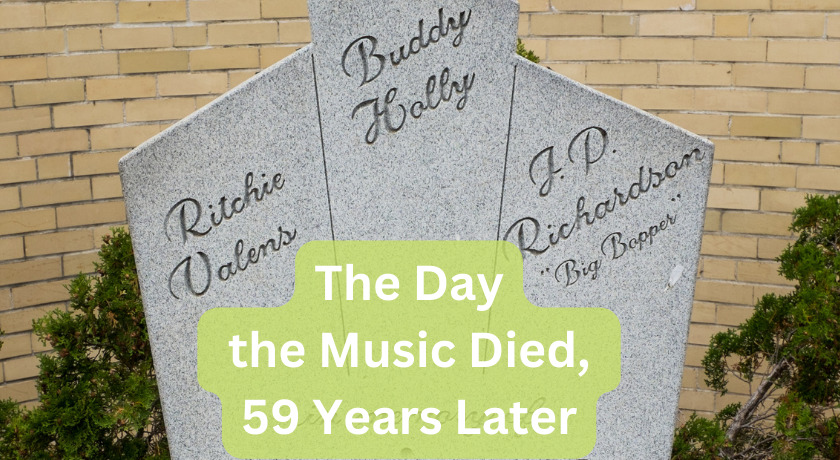“February made me shiver
With every paper I delivered.
Bad news on the doorstep,
I couldn’t take one more step.
I can’t remember if I cried
When I read about his widowed bride.
But something touched me deep inside
The day the music died.”
Today is the 64th anniversary of that “day the music died” that Don McLean referenced in his 1971 No.1 hit, “American Pie”.
February 3, 1959 was a day that lived in infamy and sadness for years, seeing the death of up and coming rock-n-rollers Buddy Holly, Ritchie Valens, and JP “The Big Bopper” Richardson.
The musicians were touring for the Winter Dance Party Tour, originally traveling by bus. But when the bus experienced mechanical troubles, Holly called for a plane to fly from where they were—in Mason City, Iowa—to Moorhead, Minnesota.
Buddy Holly was traveling with his band, The Crickets, which consisted of Tommy Allsup, Carl Bunch, and Waylon Jennings. Since Richardson was sick with the flu, he convinced Jennings to give up his seat on the plane so that he didn’t have to wait too long for another bus to take them to where they were headed. Jennings would meet them in Minnesota.
Ritchie Valens won his spot on the plane from a coin toss.
Minutes after the plane took off, it crashed and killed everyone on board. Holly was 22, Richardson 28, and Valens only 17.
Investigators blamed the crash on “bad weather and pilot error,” per the History Channel.
The three of them were all just starting their highly anticipated musical careers, which already saw a great deal of success, especially from Holly.
Buddy Holly was born in Lubbock, Texas and started off singing country music with friends he grew up with, according to the History Channel. He soon transitioned into rock and roll after opening for other musicians, including Elvis.
He saw his rise to stardom throughout the 1950s with successful songs like “Everyday”, “That’ll Be The Day”, and “Peggy Sue”, as well as his band having a radio show. He began internationally touring only a year before his death.
JP Richardson, known for his DJ and performer alias, “The Big Bopper”, started as a Texas radio disk jockey before pursuing a career as a musician, writing and recording his own songs. His biggest success was with his top 10 radio hit, “Chantilly Lace”, in 1958.
Richard Valenzuela, aka Ritchie Valens, is probably best known for his rendition of “La Bamba” which was released only a month before the plane crash. He grew up in LA, and was still navigating through young adulthood at the time of his death, only living to be 17 years old.
Their short-lived stories have been explored in various modes, including film and music. The 1978 movie, The Buddy Holly Story, saw Gary Busey star as the title musician and was very well received by fans and critics, alongside the 1987 film, La Bamba, biographing the story of Ritchie Valens with Lou Diamond Phillips playing the LA native.
Most memorably, the story and impact of the fatal 1959 plane crash is sung about in the 1971 classic, “American Pie”, written by Don McLean for his album of the same name. He introduces the song with his remembrance of that day when he was younger, delivering papers with the crash covering the front page.
In a documentary released last year, The Day the Music Died/American Pie, McLean broke over 50 years of silence regarding the lyrics to his acclaimed rock and roll historical anthem.
Forbes explained McLean’s description of the song as “a reflection of what was happening in America during the 1960s with the assassinations of the Kennedys, Martin Luther King, Jr, and the Vietnam War. For McLean, it started with what he called the end of the happy 50s, the tragic plane crash of Buddy Holly, Ritchie Valens, and JD “the Big Bopper” Richardson in February of 1959. The day the music died.”
So, in honor of the musicians whose careers and lives were taken from them far too soon, take your Chevy to a levy (even if it’s dry) and drink some whiskey and rye. Most importantly, have the rock-n-rollers in your thoughts as you sing along, belting, “This’ll be the day that I die.”
Sources:



